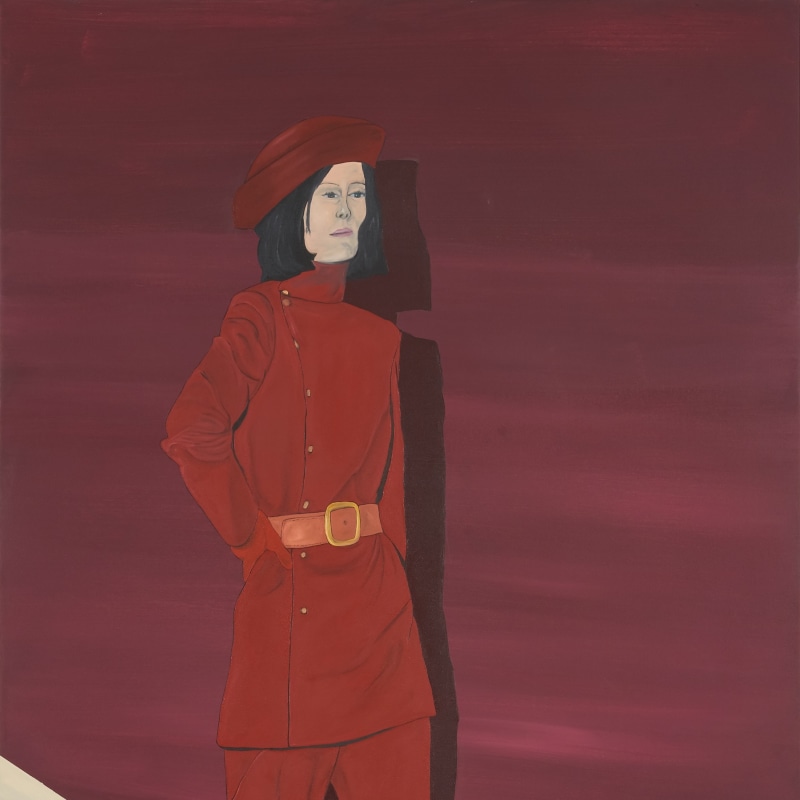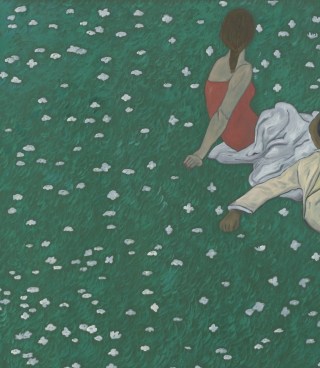Frieze Seoul 2024: Honor Titus
Timothy Taylor is pleased to present Consider Me Charmed, an exhibition of new paintings by Honor Titus at Frieze Seoul, 4–7 September. The artist’s first solo presentation in South Korea will feature canvases from a new series dedicated to femininity that also reflects on notions of class, beauty, fashion, and social mores.
In his scenes of opulent leisure, Titus’s figures lounge, preen, play, pose, dance, and seduce, seemingly protected in their comfortable world views. Revelling in the aesthetics of the inter- and post-war periods, Titus references jazz-age and sock-hop fashions, lawn games and tennis whites, capturing his subjects with a delicate sensitivity. He reconceives what a portrait might achieve by drawing on the methods of the nineteenth-century French Symbolist group Les Nabis, who employed stylized patterning and decorative elements, conveying the complexity of their subjects’ inner worlds through the designs that surround them. Though Titus’s paintings are subtle and hermetically quiet, they manage to suggest the violence and alienation that can undergird a dandyish veneer—the exploitation and exclusion that make luxury possible. With an uncanny ability to hold adoration and critique together, Titus explores the idea that beauty has no moral dimension.
For his presentation at Frieze Seoul, Titus has centred on portraits of women. Building on the traditions of American Pop, he reflects on the feminine allure, particularly its role in advertising and commercial aesthetics. In À la mode, a 1940s-era woman in sharp crimson suiting walks the runway. Gazing coolly ahead, she appears chic and impenetrable. But the space she inhabits is tangibly shallow—her shadow is cast on the burgundy wall just inches beyond her, generating a sense of claustrophobia. In the lower left corner of the composition, a vaguely threatening dress shoe asserts itself, suggesting the world of onlookers that behold the model.
Similar dynamics of the gaze appear in the grisaille painting Tiny Patron, which pictures an elegant figure in a white gown that gathers sumptuously off her shoulders. She looks down, averting the eye of the viewer, but holds her hands in graceful poise, acknowledging that she is being observed. Behind her, a long hallway leads to a painting in an ornate frame, and the flooring and door are patterned with stark geometric patterns. These hard edges emphasise the organic shapeliness of the woman’s form; they foreground her beauty, but with a nod to Pygmalion, they also underscore ideas of contrast and belonging.
In After School by The Cloisters, a young woman styled in the aesthetic of a mid-century co-ed sits on the windowsill of a large brick building. Luxuriating in the sun and baring her legs above neat saddle shoes, she takes in an unknown view with a bemused calm. Titus removes any sense of context (specifically height) from the image—the woman might be inches or stories from the ground. Flirting with danger or a rugby player below her, she appears to believe she is invulnerable. Across these refined, nuanced paintings, Titus offers a finespun meditation on beauty, power, lack, and desire.
-
Press
-

Work in Progress: Honor Titus
2 August 2024Honor Titus is renowned for work that pierces the opulent veneer of Western culture, offering windows onto moments of isolation, loss and desire. Frieze Seoul 2024 is Titus's first solo... -

Highlights at Frieze Seoul 2024: Honor Titus
21 August 2024Frieze Seoul returns to COEX in Gangnam, 4 – 7 September 2024, with more than 110 galleries offering an in-depth view of Korea's art scene alongside that of Asia and...
-
-
To learn about our presentation, please provide your contact information



